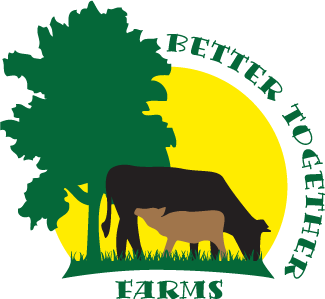In deciding what to farm and how to farm it, Better Together Farms adheres to the following three principles.
Think in systems
Sir Albert Howard, one of the pioneers of the organic movement, recommended "...treating the whole problem of health in soil, plant, animal and man as one great subject."
The organic movement put this into a chain: healthy soil produces healthy plants which produce healthy animals which produce healthy people. However science has shown this to be a vast over-simplification: each element of that chain affects every other element through feedback loops. For example, the hoofprints of cattle create pockets in the soil which capture rain which allow plants to grow bigger which mean their roots reach farther and produce more exudates which change the chemical composition and microfauna of the soil.
"When we try to pick out anything by itself, we find it hitched to everything else in the Universe."
- John Muir
If this world view resonates with you then you probably want to read The Third Plate -- field notes on the future of food by Dan Barber. The first plate is the currently dominant industrial food system. The second plate characterizes the farm to table movement: the same food as the first plate but raised better -- it hasn't changed the politics or economics of how North Americans eat, which is not sustainable. The third plate is a cuisine that makes a sustainable system of agriculture tasty.
Another aspect is the Holistic Management framework of ecosystems as four interdependent systems: capturing as much sunlight as possible (the energy system), cycling nutrients, cycling water, and the succession of communities of flora and fauna (and especially microfauna).
Grow nature
Because everything is interconnected (thinking in systems), we are probably doing something right if the populations and variety of wildlife (bugs, plants, fungi, and animals) are increasing on our farm.
Moreover, maintaining diverse wildlife habitats on our farm is like a biological insurance policy. If anything gets too far out of balance under our management there should be a reserve of nearby biological agents ready to nip the deviation in the bud.
Trust evolution
Large ruminant herds co-evolved with grasslands for 24 million years before humans domesticated animals. So if "cows eat grass" then it is equally true that grass is meant to be grazed (see Cattle and Grass for more on this). When I am trying to accomplish something with the ecosystem or wondering why something is happening, I try to frame it in how flora and fauna have co-evolved in ecosystems and address it in a way consistent with those ecosystems.
Some call this agroecology, others call it bio-mimicry. Dan Barber framed it well:
To grow nature is to encourage more of it. That's not easy to do. More nature means less control. Less control requires a certain kind of faith, which is where the worldview comes into play. Do you see the natural world as needing modification and improvement, or do you see it as something to be observed and interpreted? Do you view humans as a small part of an unbelievably complicated and fragile system, or do you view us as the commanders?
The Third Plate, page 19
